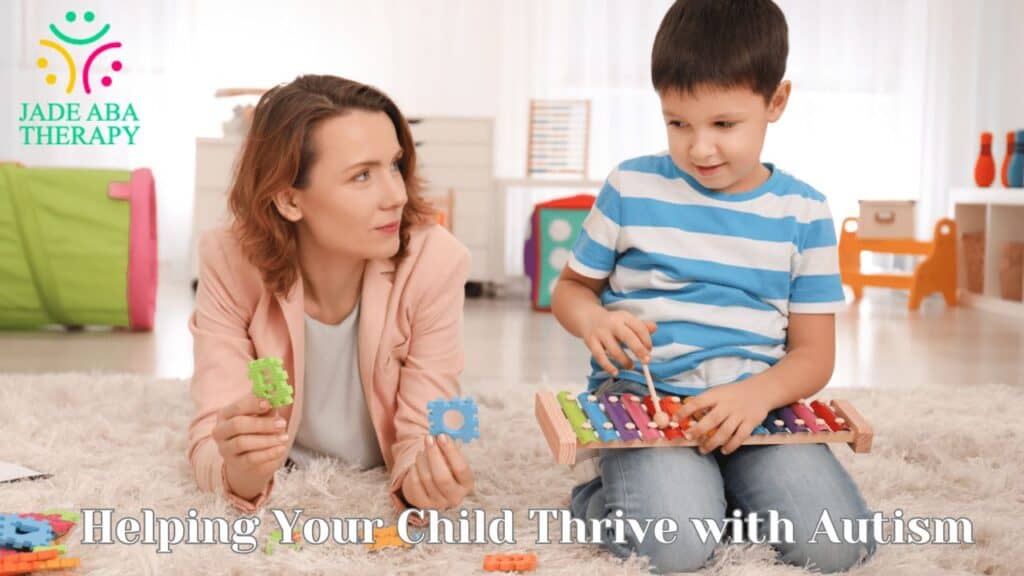Autism spectrum disorder (ASD) affects 1 in 44 children in the United States, according to the CDC. As a parent, receiving an autism diagnosis for your child can feel overwhelming. You likely have many questions about what it means for your child’s future and how you can best support them. The good news is that with the right treatments and supports in place, children with autism can thrive and live fulfilling lives. This guide will provide an overview of strategies for managing autism and helping your child cope with challenges.

Understanding Autism Spectrum Disorder
Autism is a complex neurodevelopmental condition that affects communication, social skills, behavior, and sensory processing. There is no single type of autism – it is called a “spectrum” disorder because symptoms can range from mild to severe and manifest differently in each child. Some key characteristics of autism include:
- Difficulties with social communication and interaction
- Repetitive behaviors or restricted interests
- Sensory sensitivity
- Developmental delays in language, motor skills, or other areas
Autism is also associated with co-occurring conditions like ADHD, anxiety, OCD, and gastrointestinal issues. Every child with autism has a unique combination of challenges and strengths. With the right support, many can develop skills to manage their symptoms, communicate effectively, build relationships, and live independent lives.
Emotional Coping Strategies
In addition to the core symptoms of autism, many individuals struggle with co-occurring mental health or behavioral challenges:
- Anxiety
- Depression
- Obsessive compulsive disorder
- ADHD
- Self-injurious behaviors
Managing these issues through counseling, therapy, and medication (if needed) is key for emotional wellbeing. Autism behavioral therapies can also teach self-regulation skills.
Therapies That Build Emotional Coping Skills
- Applied Behavior Analysis (ABA) uses positive reinforcement to teach communication, social, adaptive, and behavior management skills.
- Speech therapy improves communication abilities.
- Occupational therapy focuses on sensory processing, motor skills, and performing daily tasks.
- Cognitive behavioral therapy (CBT) helps manage anxiety, anger, OCD, and more.
Creating a low-stress home environment is also beneficial:
- Stick to routines
- Eliminate sensory triggers like loud noises
- Provide fidget toys or headphones to manage anxiety
- Create a designated quiet space or “calm down” area
Physical Health Strategies
Along with behavioral and emotional difficulties, many individuals with autism experience medical issues like:
- Gastrointestinal problems
- Sleep issues
- Seizures
- Food sensitivities
Seeing doctors who specialize in treating autism can ensure these physical health concerns are properly addressed. Lifestyle strategies like a healthy diet, regular exercise, and good sleep hygiene also help.
Exploring Special Diets for Autism
Some parents try restrictive diets like gluten-free/casein-free or ketogenic diets to relieve autism symptoms. The evidence is limited, but special diets may help with:
- Gastrointestinal problems
- Picky eating habits
- Food sensitivities causing behavioral reactions
Talk to your doctor before eliminating any major food groups. Track any changes in behavior and symptoms to determine if a special diet could be beneficial.
Building Social Skills
Difficulty with social communication and interaction is a core characteristic of autism. But social skills can be learned through targeted therapies and practice.
- Speech therapy focuses on pragmatic language skills for social interaction.
- Social skills groups provide a structured setting for kids to practice communication and relationship building.
- Peer modeling and buddy programs utilize neurotypical peers to demonstrate social behavior.
Parents can also arrange real-world opportunities for practicing socialization, like play dates, extracurricular activities, and community outings. Maintaining a patient, positive attitude helps foster social motivation.
Accessing Support Systems
Getting involved with the autism community provides invaluable support and resources for families. Here are some options to consider:
- Local autism organizations like your state’s Autism Society chapter offer support groups, events, and services.
- National autism advocacy groups like Autism Speaks provide resources, research, and opportunities to get involved.
- Online communities like Autism Forums connect parents facing similar challenges.
- Conferences and workshops offer the chance to learn from experts.
Connecting with other autism parents provides emotional support, while organizations keep you informed on the latest research and therapies.
Finding the Right Therapies for Your Child
With many different therapy approaches available, choosing the right options for your child can feel overwhelming. Here are some tips:
- Learn about evidence-based therapies with proven results.
- Work with providers experienced in treating autism.
- Choose therapies that target your child’s specific needs.
- Develop an integrated treatment plan covering different skill areas.
- Be consistent and stick with therapies long enough to see progress.
- Track your child’s improvements so therapies can be adjusted accordingly.
Don’t be afraid to try new things or switch approaches if something isn’t working. Every child responds differently.
Applied Behavior Analysis Therapy in Maryland
Applied behavior analysis or ABA is considered the gold standard treatment for autism. This method uses positive reinforcement and rewards to teach communication, social, play, self-care, and academic skills. Numerous studies show ABA significantly improves outcomes for children with autism.
Conclusion: Get ABA Therapy from Jade ABA
If you’re looking for an effective therapy for your child with autism, consider ABA from Jade ABA in Maryland. Their experienced therapists provide personalized in-home ABA treatment that helps children master important skills and behaviors. Jade ABA develops customized therapies based on each child’s unique needs and goals. Their compassionate team is dedicated to helping every child thrive.
To learn more about ABA therapy from Jade ABA, call (410) 616-0901 or email info@jadeaba.org. They offer a free consultation to discuss your child’s needs and how their ABA services can help. Don’t wait – get started today so your child can reach their full potential!
References
Autism spectrum disorder: Symptoms, causes, and early signs from Medical News Today
Complementary and Alternative Treatments for Autism Spectrum Disorder from the National Center for Biotechnology Information
Social Skills Training for Children with Autism from Autism Speaks
Support groups for parents of children with autism from Autism Speaks
Choosing a Treatment for Autism from Autism Speaks